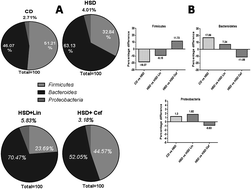Our official English website, www.x-mol.net, welcomes your
feedback! (Note: you will need to create a separate account there.)
Divergent outcomes of gut microbiota alteration upon use of spectrum antibiotics in high sugar diet-induced diabetes in rats†
RSC Advances ( IF 3.9 ) Pub Date : 2018-07-20 00:00:00 , DOI: 10.1039/c8ra03774d Bhumika Prajapati 1 , Prasant Kumar Jena 1, 2 , Sweta Patel 1 , Sriram Seshadri 1
RSC Advances ( IF 3.9 ) Pub Date : 2018-07-20 00:00:00 , DOI: 10.1039/c8ra03774d Bhumika Prajapati 1 , Prasant Kumar Jena 1, 2 , Sweta Patel 1 , Sriram Seshadri 1
Affiliation

|
Background: A sugar rich diet induces inflammation and insulin resistance (IR) mainly through gut microbiota alteration. Gut dysbiosis increases lipopolysaccharide (LPS) and reduces propionate and butyrate levels to impair the insulin signalling cascades by different molecular pathways, which progresses into IR. The present study was designed to investigate the effect of spectrum specific antibiotics on the modulation of gut microbiota and its signalling pathways to prevent diet-induced diabetes. Methods: Healthy male Wistar rats were divided into a non-diabetic group with a control diet (CD), a diabetic group with a high sucrose diet (HSD) and two antibiotic fed groups (linezolid and cefdinir; administered by oral gavage) along HSD. Physiological, biochemical, inflammatory and microbiome parameters were examined. Results: Cefdinir administration in HSD rats reduced fasting glucose, serum triglyceride, and cholesterol levels compared to HSD alone. In addition, cefdinir reduced serum LPS by decreasing the population of Gram-negative phyla, that is, Bacteroidetes and Proteobacteria in the fecal content. Furthermore, cefdinir treatment decreased hepatic/ileal/colonic Tlr4, Nlr1, and Nf-κB at the mRNA level. Moreover, cefdinir-treated rats had shown increased fecal butyrate and propionate and reduced acetate levels compared to HSD alone. Cefdinir treatment also induced ileal/colonic Gpr43 and Glut4 at the mRNA level after 12 weeks of administration. Conclusions: Taken together, these data suggest that administration of a Gram-negative spectrum antibiotic, that is, cefdinir, has modulated the gut microbiota, and reduced serum LPS and triglycerides, which prevented the progression of IR and inflammation in HSD rats.
中文翻译:

在大鼠高糖饮食诱导的糖尿病中使用光谱抗生素对肠道菌群改变的不同结果†
背景:富含糖的饮食主要通过肠道微生物群的改变引起炎症和胰岛素抵抗 (IR)。肠道菌群失调会增加脂多糖 (LPS) 并降低丙酸盐和丁酸盐水平,从而通过不同的分子途径损害胰岛素信号级联反应,进而发展为 IR。本研究旨在研究频谱特异性抗生素对调节肠道微生物群及其信号通路的影响,以预防饮食诱导的糖尿病。方法: 健康雄性 Wistar 大鼠被分为非糖尿病组和对照饮食 (CD)、糖尿病组和高蔗糖饮食 (HSD) 和两个抗生素喂养组(利奈唑胺和头孢地尼;通过口服管饲法)。检查了生理、生化、炎症和微生物组参数。结果:与单独使用 HSD 相比,在 HSD 大鼠中给予头孢地尼可降低空腹血糖、血清甘油三酯和胆固醇水平。此外,头孢地尼通过减少革兰氏阴性菌的数量来降低血清 LPS,即粪便中的拟杆菌和变形菌。此外,头孢地尼治疗可降低肝/回肠/结肠Tlr4、Nlr1和Nf-κB在 mRNA 水平。此外,与单独使用 HSD 相比,头孢地尼治疗的大鼠粪便丁酸盐和丙酸盐增加,乙酸水平降低。在给药 12 周后,头孢地尼治疗还在 mRNA 水平上诱导回肠/结肠Gpr43和Glut4 。结论:综上所述,这些数据表明,给予革兰氏阴性谱抗生素,即头孢地尼,调节了肠道微生物群,降低了血清 LPS 和甘油三酯,从而阻止了 HSD 大鼠 IR 和炎症的进展。
更新日期:2018-07-20
中文翻译:

在大鼠高糖饮食诱导的糖尿病中使用光谱抗生素对肠道菌群改变的不同结果†
背景:富含糖的饮食主要通过肠道微生物群的改变引起炎症和胰岛素抵抗 (IR)。肠道菌群失调会增加脂多糖 (LPS) 并降低丙酸盐和丁酸盐水平,从而通过不同的分子途径损害胰岛素信号级联反应,进而发展为 IR。本研究旨在研究频谱特异性抗生素对调节肠道微生物群及其信号通路的影响,以预防饮食诱导的糖尿病。方法: 健康雄性 Wistar 大鼠被分为非糖尿病组和对照饮食 (CD)、糖尿病组和高蔗糖饮食 (HSD) 和两个抗生素喂养组(利奈唑胺和头孢地尼;通过口服管饲法)。检查了生理、生化、炎症和微生物组参数。结果:与单独使用 HSD 相比,在 HSD 大鼠中给予头孢地尼可降低空腹血糖、血清甘油三酯和胆固醇水平。此外,头孢地尼通过减少革兰氏阴性菌的数量来降低血清 LPS,即粪便中的拟杆菌和变形菌。此外,头孢地尼治疗可降低肝/回肠/结肠Tlr4、Nlr1和Nf-κB在 mRNA 水平。此外,与单独使用 HSD 相比,头孢地尼治疗的大鼠粪便丁酸盐和丙酸盐增加,乙酸水平降低。在给药 12 周后,头孢地尼治疗还在 mRNA 水平上诱导回肠/结肠Gpr43和Glut4 。结论:综上所述,这些数据表明,给予革兰氏阴性谱抗生素,即头孢地尼,调节了肠道微生物群,降低了血清 LPS 和甘油三酯,从而阻止了 HSD 大鼠 IR 和炎症的进展。











































 京公网安备 11010802027423号
京公网安备 11010802027423号